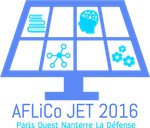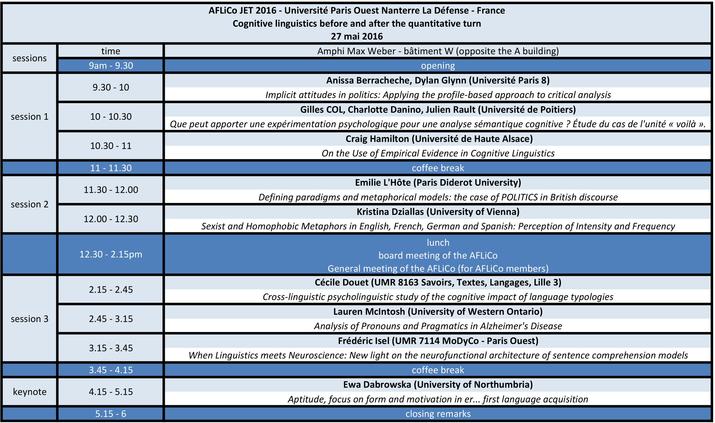|
PROGRAM Download a pdf version
KEYNOTE SPEAKER Prof. Ewa Dąbrowska (University of Northumbria, Newcastle) Ewa joined the Department of Humanities at Northumbria in 2009, having previously taught at the universities of Sheffield, Sussex, Glasgow, and Gdańsk. She is a native of Gdańsk and was educated in Poland, the US, and the UK. She has also spent some time in Germany (working at the Max Planck Institute of Evolutionary Anthropology in Leipzig) and in Japan. Her research interests include cognitive linguistics, language acquisition, the mental status of linguistic knowledge, and individual differences in the latter. She is president of the UK Cognitive Linguistics Association. In the past, She has served as a editor-in-chief of Cognitive Linguistics and member of the Governing Board of the International Cognitive Linguistics Association. Keynote abstract: Aptitude, focus on form and motivation in er... first language acquisition It is often asserted that first language acquisition and adult second language learning are “fundamentally different”. In contrast to L2 learning, first language acquisition is believed to rely almost entirely on implicit learning. Children, it is often asserted, are unable to focus on form, and because of this, language aptitude (as measured by foreign language aptitude tests such as the MLAT and PLAB) is irrelevant. There are also important differences in motivation: adult learners typically have the explicit goal of learning a new language, while children's motivation is simply to communicate, and learning occurs as a byproduct of engaging in communicative interaction. While acknowledging that there are important differences between first and second language learning, I argue that they are typically massively overstated. I argue that language aptitude plays a significant role in both L1 and L2 language learning, and that children are not only able, but also highly motivated to pay attention to form. Thus, the same cognitive mechanisms are involved in both types of learning, albeit not necessarily to the same extent. BOOK OF ABSTRACTS Download the book of abstracts (pdf). AFLiCo JET In the spring of every even year, the French Cognitive Linguistics Association holds a workshop known as JET (short for “journée d’étude” in French). After Bordeaux in 2010 and Paris in 2012 and 2014, this year’s workshop will take place at the University of Paris Ouest Nanterre La Défense in Nanterre. This is where the Third International Conference of the French Cognitive Linguistics Association took place in 2009. The workshop will be held on May 27th, 2016 at the University Paris Ouest Nanterre La Défense (France) The official languages of AFLiCo JET 2016 are French and English. However, to facilitate communication between participants, English is strongly encouraged. If you wish to present in French, we ask you to write your slides in English. CALL FOR PAPERS The French Cognitive Linguistics Association (AFLiCo) invites you to submit paper proposals for its next workshop (AFLiCo JET 2016). AFLiCo workshops provide a forum for high-quality scientific research in cognitive linguistics and, more generally, usage-based approaches to language. The topic of this year’s conference is “Cognitive Linguistics before and after the empirical turn”. With its original rejection of hypothetical modules of language structure and its focus on language use in all its complexity, first-generation cognitive linguistics is theory-driven. Dissatisfied with the practice of using themselves as sole informants, cognitive linguists have now realized the empirical implications of their own theoretical framework and have found empirical methods to be far more useful than introspection to test their hypotheses. If language is approached holistically and the structure of meaning is hooked on human experience, one challenge that cognitive linguistics has to address is whether the data-oriented methodology of the approach is in keeping with its theoretical tenets. Here is an open-ended list of topics that the workshop is about:
Cognitive linguistics is at the crossroads of compatible theoretical and methodological paradigms (construction grammar, cognitive grammar, corpus linguistics, gesture studies, language acquisition, language impairments, discourse analysis, sign languages, etc.). All these theories and methods are most welcome, including those frameworks which consider themselves distinct from cognitive linguistics but are close enough to share a good number of tenets (e.g. enunciative linguistics, functional linguistics). GUIDELINES FOR SUBMISSION Anonymous abstracts for 20-minute presentations (+ 8 minutes for questions) should include a title and a short bibliography. They should not exceed 500 words (exclusive of references, tables, and figures). They can be in English or in French. Abstracts should clearly state the following:
Include three to five keywords specifying the (sub)field, the topic, and the approach. The deadline for all abstracts is March 25th, 2016. Notification of acceptance will be given 15 days later. Submit your abstract via the workshop website. First you will need to create an account on sciencesconf.org, if you do not already have one, then click on "Submissions" then "Submit an abstract". If you need help, let us know via the contact form. Each abstract will be double-blind peer reviewed. |






